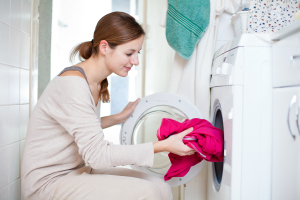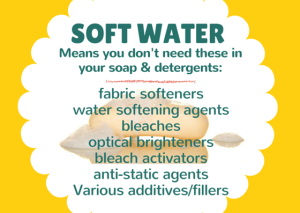When high-efficiency (HE) laundry washers were introduced a few years back, many consumers suddenly began paying more attention to the laundry soap they were buying. High efficiency machine manufacturers warned that using “regular” laundry soap rather than an “HE detergent” could void the machine’s warranty.
So what about a water softener system? Does it matter what type of soap is used after a water softener or conditioner is installed?
Why Hard Water Requires More Soap
Prior to the installation of a water softener, hard water probably made it difficult for you to get much of a suds. Hard water is known to complicate soap and detergent dissolving in water.
In fact, you may remember dumping a big scoop of laundry detergent into a top-loading  washer and waiting…only to see very few suds form. That’s because nearly twice the amount of soap must be used with hard water to achieve the same results as when operating with softened water.
washer and waiting…only to see very few suds form. That’s because nearly twice the amount of soap must be used with hard water to achieve the same results as when operating with softened water.
The minerals that make water “hard” (calcium and magnesium) interfere with the cleaning action of soap. Soap is attracted to these hardness minerals and that is why soap produces fewer suds and is less effective in hard water.
Hard water also makes it difficult to rinse soap from clothing. You may have noticed some of your clothes coming out of the laundry process feeling stiff or looking dingy. Yes, hard water limescale is clinging or adhering to that favorite pair of jeans! Washing clothes in soft water means you’ll not only need less soap to get your clothes clean, but also will be able to completely rinse the soap out of your clothing.
What Type of Soap Should I Use with a Water Softener?
If you’ve recently installed a water softener (by the way, you’ve made a great choice—congratulations), you should try to use as pure a soap as possible. Softened water actually maximizes the effectiveness of soaps and detergents. We recommend you use clear liquid soaps that are free of perfumes and dyes.
Many soap manufacturers assume their products are being used with hard water and add water softening agents and fillers to soaps, shampoos and detergents. This means that you’re paying for a filler or additive that you don’t need–and you’ll get a lot more for your money by purchasing pure soaps. A variety of online sites sell pure soaps and detergents, or there are many soap making do-it-yourself sites, if you’re feeling ambitious.
Softened water has the ability to remedy “hard water” problems.
Claims such as “softened water can save you money” were put to the test in an independent study funded by the Water Quality Research Council.* The study found that consumers can cut back on laundry detergents by 50 percent and reduce dishwashing soap by 70 percent when washing with soft water.
And when it comes to laundry stain removal, the study showed significant cost savings in energy expenses as washing machine temperatures were lowered from hot to cold and still maintained the same stain removal efficacy–when washing with softened water.
You’ll also find that with softened water, you can use less shampoo to create even greater lather and there’s no longer a need to buy “rinsing agents” for spot-free glasses and dishes!
Not sure if you have hard water? Our authorized WaterTech dealers can provide you with a free water test and help you understand the available water treatment solutions. Give them a call!
*The Detergent Savings Study was conducted in 2010 in conjunction with Scientific Services S/D, Inc. and funded by the Water Quality Research Foundation.





20 Responses
Thanks for the information. I had no idea that you’re supposed to use less soap when using a water softener. I’m definitely going to take that into account. I’ll also make sure I use the right kind of soap, just like you suggested.
Helpful post. I also have come to know some good info here. One-time installation cost of the water softener system ultimately helps to reduce costs for detergent in the long run. This logic of course influence people who are still in confusion whether they should install a water softener system or not 🙂
Glad I know not to use as much soap now. Thanks for the advice.
The cost of soap goes down, but the cost of water goes way up. Even with soap specific for soft water, and using less of it, there’s still a feeling of soapy/slimyness that takes longer to wash away. And if you take a lot of showers and wash your hands a lot like my family, then that means easily twice the water consumption. Our water bill went from about $100 per month to $160 per month. We probably save $25 – $40 per month in products, but overall, it’s not a cost savings. But it does preserve appliances.
That feeling is NOT “slimy”! It’s simply the feeling of the natural oils on your skin – oils meant to protect your skin, oils traditionally stripped away by hard water! Stop using more water, your skin is clean AND moisturized!
The salesman said it’s ‘natural oils on your skin’. I tested his theory. I washed my hands in soft water without soap. Guess what? There was no slimy feeling. I washed with soap. There WAS a slimy feeling. To further test this, I immediately washed without soap again. There was no slimy feeling. I washed again with soap. There’s that slimy feeling again. I concluded that the slimy feeling was from the soap. Try this little experiment and I think you will come to the same conclusion. I’m not knocking the water softening system, just the sales rhetoric.
I’m use soft water in my house, and when I do my laundry, my clothes come out hard and crushed. Please help.
Can you recommend a laundry soap to use with soft water?
We do not have a specific laundry soap that we recommend.
I would like to know which laundry soap you recommend. Thank you.
We don’t recommend or endorse any certain brand of soap.
My well water tested at 37 grains hardness. My plumber installed a Sumo III system. I was excited to have spot free dishes, faucets and sinks. I have more spots now but they wipe off. I’m told this is the salt used to soften the water. Is this normal?
Hi Tressa: It is important to get a complete water analysis done so you can properly treat all the constituents in you water. It sounds like you have extremely hard water that the softener is removing. However, white residue that can be wiped off of dishes is often from having high Total Dissolved Solids in the water. TDS is usually only removed by a Reverse Osmosis (RO) system http://www.watertech.com/product/ro-puremax-2-water-purifier/
Can you use tide pods with a water softener?
Sure. Some Tide Pods include both detergent and fabric softener. When you own a water softener, a fabric softener isn’t needed. But there isn’t a problem if a little fabric softener is included in the Pod.
Hi, I don’t know if I have soft or hard water, but my cotton clothes have oiling looking splatters on them, I have a new washer and dryer. one year old and this issue is be on going since I moved into my house 8 years ago. I have used several different liquid detergents, Any suggestions on what this could be. I have had my water tested by the township. I they don’t show anything wrong with the water. Any suggestions would be appreciated.
Hi Ann, your township water analysis is very general to your area’s water. I would recommend working with a local water specialist to get a lab analysis performed. Then, you could find out if it is something in the water that could be causing the splatter marks or at least narrow down what could be the cause.
Thank you for your response. Do you know if there is any labs out there that could test the clothing for what the stain consists of.
Ann, do you use liquid fabric softener? I had the same problem until I discontinued use of liquid fabric softener. I switched to scented dryer sheets, and that eliminated the oily spots. Hope this helps!
Thank you for your response. Do you know if there is any labs out there that could test the clothing for what the stain consists of.